It looks like you're using an Ad Blocker.
Please white-list or disable AboveTopSecret.com in your ad-blocking tool.
Thank you.
Some features of ATS will be disabled while you continue to use an ad-blocker.
5
share:
more of a philosophy than a religion
www.bbc.com...
I'm really not sure what this philosophy is; the article isn't too clear (or maybe I'm just too dense).
it does promote ecological responsibility (worthwhile) and space travel (a good thing, in my opinion, but not a game changer).
not really getting this. interesting though.
maybe some of the heavy thinkers here can splain this for the rest of us. potential mass belief? or just for a handful of elite science types?
www.bbc.com...
Fyodorov's philosophy stemmed from the defining moment of his life – the deaths of his father and his father's father – and his family's subsequent departure from their rural idyll. All his intellectual endeavours can be understood as an attempt to repair that rupture, to restore and recapture a lost Eden. His Philosophy of the Common Task envisages a world in which each generation will resurrect its dead ancestors (we should give birth to fathers, he wrote, rather than children). But this will soon overpopulate the world, so it is imperative that we reach into space to settle on new stars, where the resurrected can live harmoniously. Yet the further we venture, the more we will need to revive ("All matter is the dust of ancestors") – so the only solution is radical life extension: the death of death itself.
I'm really not sure what this philosophy is; the article isn't too clear (or maybe I'm just too dense).
it does promote ecological responsibility (worthwhile) and space travel (a good thing, in my opinion, but not a game changer).
Harvard University professor Anya Bernstein, author of The Future of Immortality: Remaking Life and Death in Contemporary Russia, says that 21st Century Cosmists "worship" Gagarin for his role in realising Fyodorov's "prophetic" vision. By leaving this mortal coil, we fulfil God's mission, wrote Fyodorov, and "the divine word becomes our divine action". In time, we become the cosmic mind of the universe itself – a concept called the "noosphere", developed by Tsiolkovsky's contemporary Vladimir Vernadsky.
not really getting this. interesting though.
maybe some of the heavy thinkers here can splain this for the rest of us. potential mass belief? or just for a handful of elite science types?
The two quotes seem in conflict. The first is about physical resurrection (I think) but that causes a crowding problem. The second is about "becoming
one with the universe" after death. I think.
edit on 4/25/2021 by Phage because: (no reason given)
a reply to: ElGoobero
Strange, weird counterpart to West.
Russian Cosmism: a national mythology against transhumanism
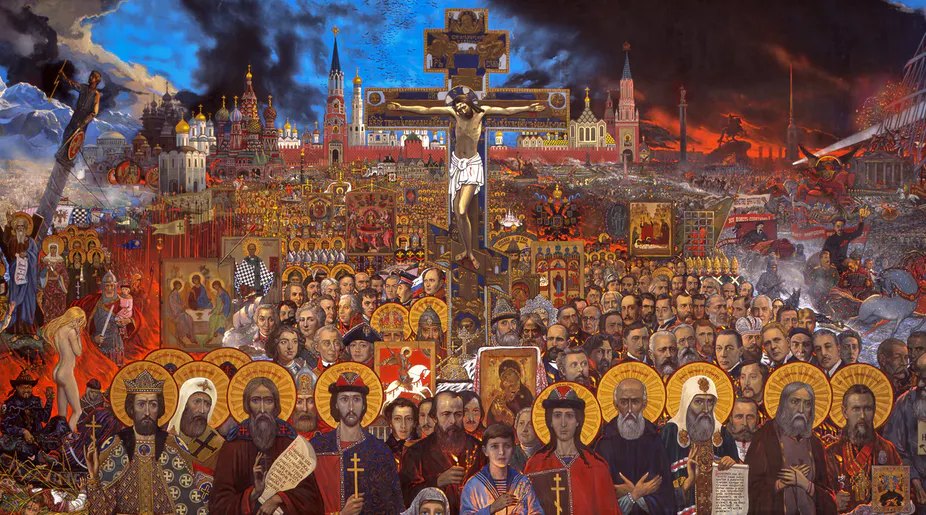
Ilya Glazunov’s painting Eternal Russia (Glazunov Museum, Moscow) expresses ideas dear to contemporary propagators of cosmism, notably the alliance of Soviet modernity and the traditional values of the Russian empire.
Noocosmology (New Russian Cos-mology)...
The Cosmic Subject in Post-Soviet Russia: Noocosmology, Space-Oriented Spiritualism, and the Problem of the Securitization of the Soul - a chapter from the book "Cultural and Political Imaginaries in Putin’s Russia."
The military unit 10003 - psychics on guard of the world
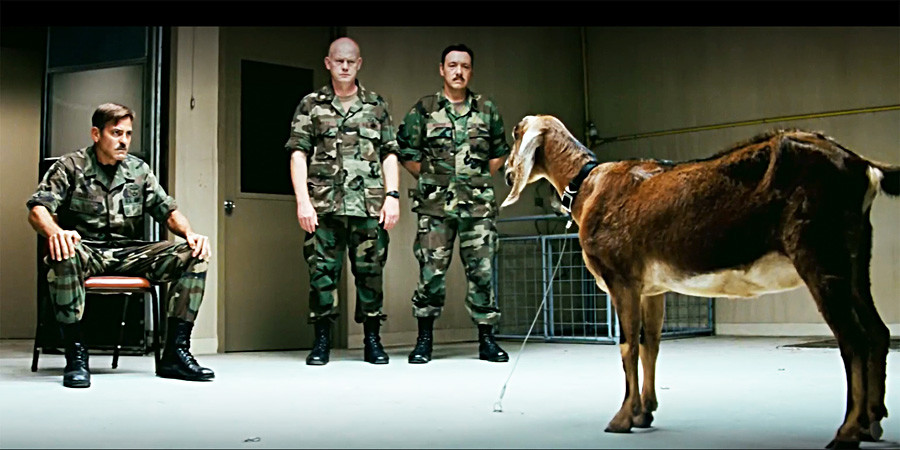
During these same years of the legendary Unit 10003, the encrypted name of the Expert-Analytical Department for unusual human capabilities and special types of weapons was headed by anthropo phenomenologist Savin Aleksey Yurievich; in the West, the CIA's STARGATE program was formed and this confrontation in the United States received the name "psi-war." The research of American scientists began the study of so-called vision, which is very similar to the Russian concept of clairvoyance. Its Russian officers were called “Wizards with shoulder loops.” The secret Russian Unit 10003 was supposedly shutdown in 2003. I think Savin's counterpart was SRI physicist...
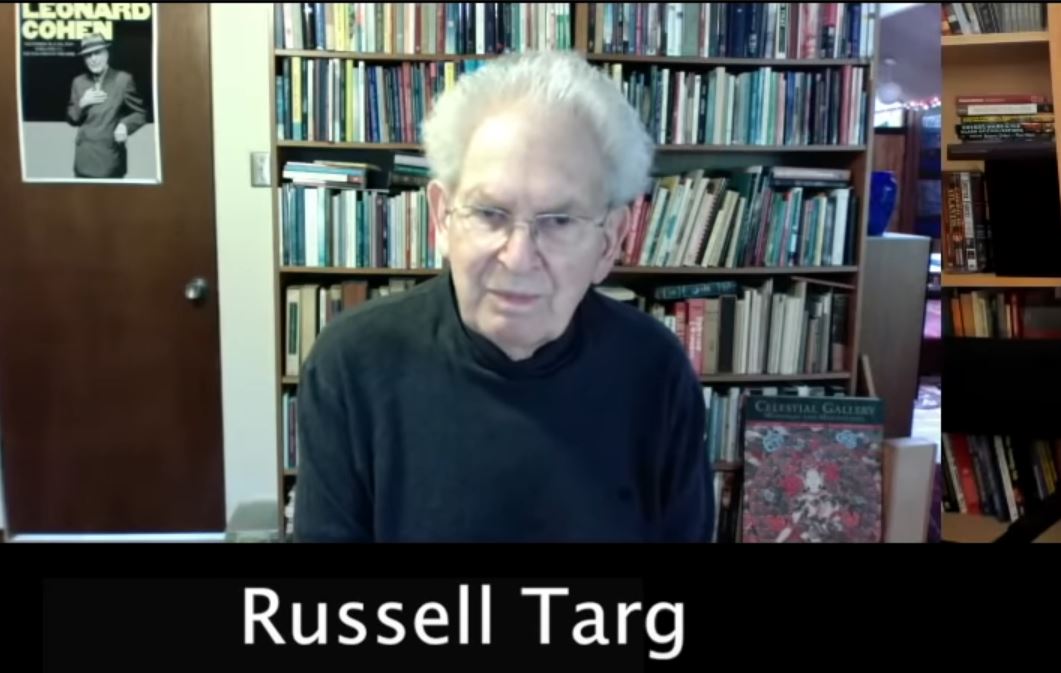
Unit 10003 logo: (Intellectual Club)
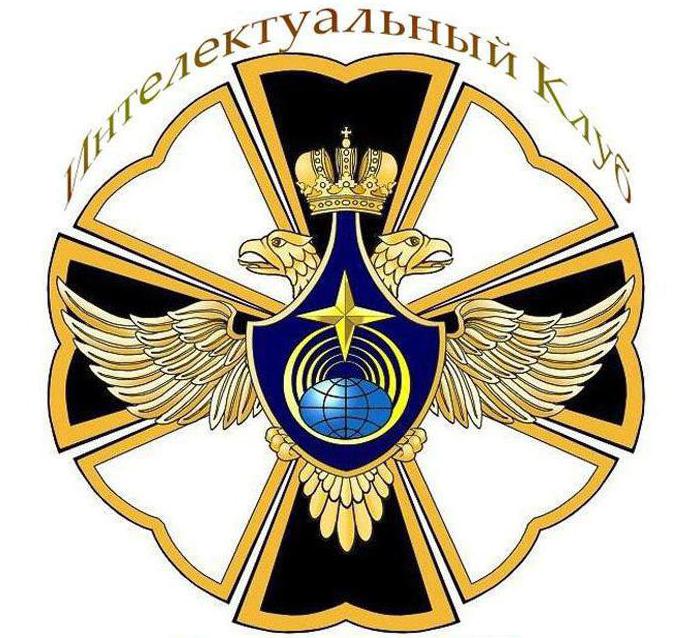
In phenomenological anthropology, the focus is on the way in which meanings become and are reality to the people themselves: how meanings appear to them and coincide with the practical everyday world in which one needs to survive.
Club "Team 10003" invites you to the Blitz-course "Magic in 90 minutes" in St. Petersburg (Russian language site)
Goog Translation:
The 'Eye' is the cover of his book, "Beyin Savaşları" - translation: "Brain Wars"
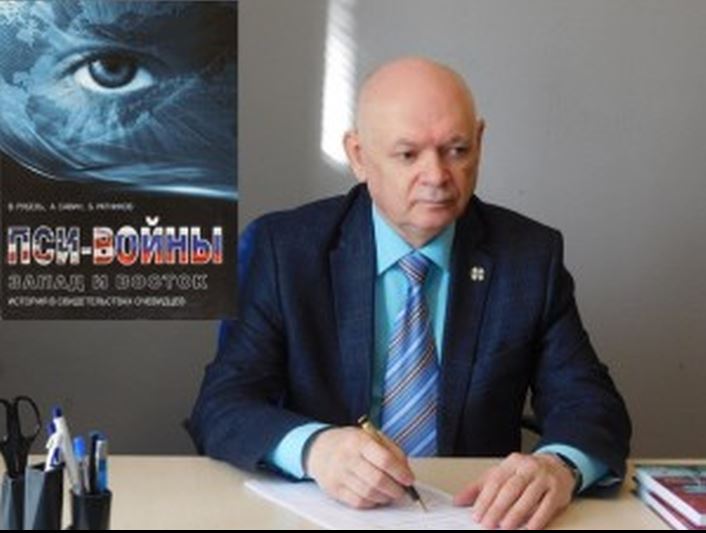
Strange, weird counterpart to West.
Russian Cosmism: a national mythology against transhumanism

Ilya Glazunov’s painting Eternal Russia (Glazunov Museum, Moscow) expresses ideas dear to contemporary propagators of cosmism, notably the alliance of Soviet modernity and the traditional values of the Russian empire.
Cosmism, a complex intellectual movement that blends Orthodox theology with scientific forecasting, emerged almost 150 years ago and is once again on the rise in Russia. Part of the country’s elite holds Cosmism as a distinctively Russian response to the supposedly dominant transhumanism in the West. What is Cosmism, and how is it spreading in Russia today?
In the 1970s, a group of Soviet intellectuals became passionate about the esoteric theses of these authors and brought them together under the name of “Russian Cosmism”. In contrast with the official communist ideology, Cosmism was a heterodox theory. It nevertheless aroused the interest of academics as well as high-ranking members of the political and military establishment.
One of these was Lieutenant-General Alexey Savin, the director of the secret unit 10003 in charge of research on the military use of paranormal phenomena from 1989 to 2003. Inspired by his reading of Vernadsky, he developed the principles of a science of the extraterrestrial world called “noocosmology”. Likewise, in 1994, Vladimir Rubanov, deputy secretary of the Russian Security Council and former director of the KGB’s analytical department, proposed to use Cosmism as the basis of “Russia’s national identity.”
Noocosmology (New Russian Cos-mology)...
The Cosmic Subject in Post-Soviet Russia: Noocosmology, Space-Oriented Spiritualism, and the Problem of the Securitization of the Soul - a chapter from the book "Cultural and Political Imaginaries in Putin’s Russia."
The military unit 10003 - psychics on guard of the world
The Soviet secret services became interested in the supernatural and, in particular, extrasensory capabilities of a person almost immediately after the end of the civil war. But only at the end of the 1980-s managed to somehow structure the research in this area.
Thus, in recent years, the so-called perestroika in the Soviet military department turned into a group of psychics, who very convincingly promised to assist in solving many problems, in particular, preventing emergencies, searching for missing people, airplanes and ships, and treating wounded and seriously ill soldiers. Their proposal has been carefully analyzed. As a result, on the initiative of the Chief of the General Staff, General of the Army Mikhail Moiseyev, a new unit was formed - the military unit 10003. The commander of the unit would be Colonel Savin Aleksey Yurievich. The entire staff of the unit consisted of 10 people who were distinguished by their extraordinary and large-scale thinking and had outstanding abilities for military affairs.

During these same years of the legendary Unit 10003, the encrypted name of the Expert-Analytical Department for unusual human capabilities and special types of weapons was headed by anthropo phenomenologist Savin Aleksey Yurievich; in the West, the CIA's STARGATE program was formed and this confrontation in the United States received the name "psi-war." The research of American scientists began the study of so-called vision, which is very similar to the Russian concept of clairvoyance. Its Russian officers were called “Wizards with shoulder loops.” The secret Russian Unit 10003 was supposedly shutdown in 2003. I think Savin's counterpart was SRI physicist...

Unit 10003 logo: (Intellectual Club)

In phenomenological anthropology, the focus is on the way in which meanings become and are reality to the people themselves: how meanings appear to them and coincide with the practical everyday world in which one needs to survive.
Club "Team 10003" invites you to the Blitz-course "Magic in 90 minutes" in St. Petersburg (Russian language site)
Goog Translation:
Participants in an operational mode and in practice will get acquainted with the basics of military parapsychology, super-intuition, supersensible perception, discover phenomenal creative abilities using the methods of military unit 10003.
They will try their hand at writing short quatrains, stories on given topics, master the basics of associative thinking and assessing the personal qualities of people who are completely unknown to them, by name, mental representation and personal things.
The 'Eye' is the cover of his book, "Beyin Savaşları" - translation: "Brain Wars"

thanks to you both for good posts.
to paraphrase P.J. O'Rourke,
never get into a brain war with a country in which chess is a spectator sport.
to paraphrase P.J. O'Rourke,
never get into a brain war with a country in which chess is a spectator sport.
originally posted by: ElGoobero
more of a philosophy than a religion
www.bbc.com...
Fyodorov's philosophy stemmed from the defining moment of his life – the deaths of his father and his father's father – and his family's subsequent departure from their rural idyll. All his intellectual endeavours can be understood as an attempt to repair that rupture, to restore and recapture a lost Eden. His Philosophy of the Common Task envisages a world in which each generation will resurrect its dead ancestors (we should give birth to fathers, he wrote, rather than children). But this will soon overpopulate the world, so it is imperative that we reach into space to settle on new stars, where the resurrected can live harmoniously. Yet the further we venture, the more we will need to revive ("All matter is the dust of ancestors") – so the only solution is radical life extension: the death of death itself.
I'm really not sure what this philosophy is; the article isn't too clear (or maybe I'm just too dense).
it does promote ecological responsibility (worthwhile) and space travel (a good thing, in my opinion, but not a game changer).
Harvard University professor Anya Bernstein, author of The Future of Immortality: Remaking Life and Death in Contemporary Russia, says that 21st Century Cosmists "worship" Gagarin for his role in realising Fyodorov's "prophetic" vision. By leaving this mortal coil, we fulfil God's mission, wrote Fyodorov, and "the divine word becomes our divine action". In time, we become the cosmic mind of the universe itself – a concept called the "noosphere", developed by Tsiolkovsky's contemporary Vladimir Vernadsky.
not really getting this. interesting though.
maybe some of the heavy thinkers here can splain this for the rest of us. potential mass belief? or just for a handful of elite science types?
What you are describing sounds like a parasitic outbreak. Consume, reproduce, expand, conquer, consume, etc.
new topics
-
Potter to WHU
World Sports: 3 hours ago -
Dr. Demento
Music: 5 hours ago -
The elephant in the room (wearing a hoodie)
US Political Madness: 5 hours ago -
To become president, Zelensky had to learn Ukrainian
Political Conspiracies: 11 hours ago
top topics
-
The elephant in the room (wearing a hoodie)
US Political Madness: 5 hours ago, 8 flags -
Green Grapes
General Chit Chat: 15 hours ago, 7 flags -
To become president, Zelensky had to learn Ukrainian
Political Conspiracies: 11 hours ago, 6 flags -
Dr. Demento
Music: 5 hours ago, 4 flags -
Potter to WHU
World Sports: 3 hours ago, 1 flags
5
